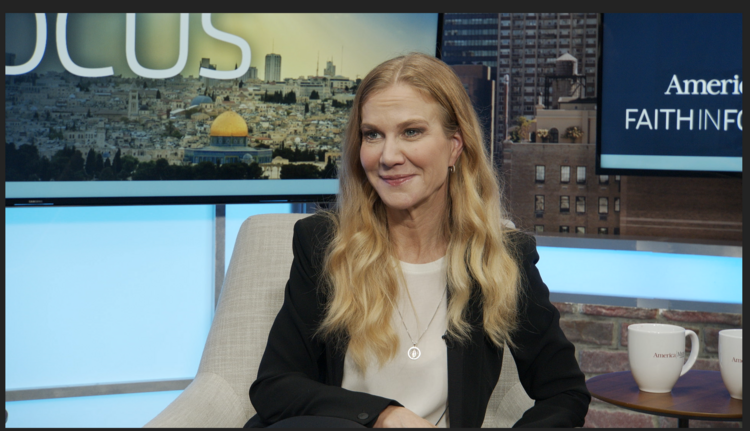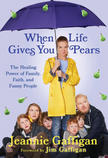Jeannie Gaffigan confronts the unknown with courage and humor in new memoir
As a child from a homeschooling family of six, I find Jim and Jeannie Gaffigan and their brood of five both intimately familiar and breathtakingly alien. Although Jeannie Gaffigan’s new book, When Life Gives You Pears, chronicles an extraordinary crisis in her family’s life, it is really the family’s ordinary day-to-day routines that inspire awe. Understanding the chaos of a large family, particularly a large family under the supervision of a high-functioning supermama, I find the metropolitan milieu of the Gaffigan’s family circus all the more mind-boggling. To take the revered tradition of a large Midwestern family to New York City is a gutsy act of defiance; bringing a child into brunch hour at a twee NoLIta restaurant is a veritable act of revolt. To bring five is practically a cultural revolution.
Even Jeannie Gaffigan’s life before her brain tumor sounds like it demanded superhero levels of chutzpah. Jeannie’s morning ritual of circling Manhattan to conduct school drop-off before her workday has me exhausted in half a page. Searching for a brunch spot after Mass that seats all the family and friends, managing doctor’s appointments, juggling the demands of everyone all at once: In all these trials, Jeannie Gaffigan is a bold apologist for New York City as a breeding ground for the communal life of big families.
Perhaps it is no surprise then that Jeannie has grit and fortitude in spades to carry her family through the harrowing ordeal of a brain tumor. Jeannie Gaffigan is an infinitely touching and personable writer, and her charm and force-of-nature persona saturate each page. In both structure and tone, When Life Gives You Pears reads as a polished version of a long catch-up conversation with a good friend.
According to Aristotle, poetry and drama do not, like histories, merely narrate singular events or tell one particular person’s story. Reading literature or watching drama is supposed to give the listener or reader an insight into the nature of our shared humanity. Who are we: Who am I and who are you, my neighbor? As a genre, memoirs like Gaffigan’s give us insight into specific histories of their family life, often chronicling the extremities of human experience—like brain surgery—but providing insight into common human experience.
In both structure and tone, When Life Gives You Pears reads as a polished version of a long catch-up conversation with a good friend.
Despite its initial hook as a book about persevering heroically in the face of a pear-shaped brain tumor, Jeannie Gaffigan’s odyssey is primarily a spiritual journey. Incidentally, pears are also a pivotal plot point on the path to conversion of Augustine, whose Confessions is arguably the most famous conversion memoir in the history of Christianity. Like Augustine, Jeannie Gaffigan’s pear also leads to a deeper spiritual conversion. After the initial build-up to diagnosis and then surgery, the second (and slightly longer) half of Gaffigan’s book focuses almost exclusively on her recovery. Completely immobilized in a hospital bed, Gaffigan allows the inner movements of her heart and soul to become the central action.
I found the most moving moments of the book to be Gaffigan’s encounters with her own vulnerability and weakness. After the initial operation, Jeannie spends two brutal weeks in the ICU. During that time, she is unable to speak, see her children, drink or eat. She grapples with her perfectionist, type-A personality and how it has prevented her from simply being present for those she loves most.
Ignatius’ cannonball-sized crisis led to a moment of conversion, and Jeannie’s pear-shaped medical emergency provides the same catalyst for conversion in her own life.
A constant theme of Jeannie’s recovery is her inability to eat. She is not allowed to consume anything through her throat—not even water—as her recovering brainstem is unable to regulate her swallowing muscles or reflexes properly. She receives nourishment by food being delivered directly to her stomach, which doesn’t truly satisfy her urge to eat.
The human tongue is a dense network of nerves that connect to our brains. Eating not only delivers nutrients to our bodies, but the nerves on our tongues also stimulate the pleasure centers of our brains. Our tongues tell our mind and body that not only are we alive, we are living, drinking it up to the very last drop.
Jeannie’s inability to eat aptly sacramentalizes the interior desolation she experiences in the hospital. Like Saint Ignatius recuperating in his father’s home in Loyola, Jeannie spends her mind-numbing weeks in the chaotic ICU. Like Ignatius, she discovers both her susceptibility to boredom and bitterness and that an encounter with God can provide relief and consolation, even in the midst of desolation.
Ignatius’ injury prompted his extended encounter with the story of Christ and with the men and women who had followed Christ’s command to discipleship. Ignatius’ cannonball-sized crisis led to a moment of conversion, and Jeannie’s pear-shaped medical emergency provides the same catalyst for conversion in her own life.
While Jeannie salivates over a still life painting of fruit, hungering and thirsting for just a drop of water or bite of Shake Shack, she discovers the interior hunger underneath her busy life. She hungers for presence: to spend time with her children, to enjoy the life she and her husband have built. She strives to focus less on keeping the ship running seamlessly and to concentrate more on the reason they’re on the voyage: one another. She vows to live her life differently—to let love and gratitude lead her rather than worry or control. It’s a lesson that resonates deeply, at least with this reader.
When Life Gives You Pears offers a vulnerable look into the power of walking through a precarious moment of life with the courage of faith. One of the book’s most compelling moments is a slight aside leading up to the climax of brain surgery. Right before surgery, Jeannie learns from her doctors that they discovered a disease affecting the carotid arteries in her neck, which they would not have found if she had not required brain surgery. It’s a true throwaway line; Gaffigan never extrapolates on the moment. But it’s a wonderful statement of mystery—that when life gives you pears, even the pears can be a gift.
This article also appeared in print, under the headline “Fruits Bitter and Sweet,” in the October 14, 2019, issue.











